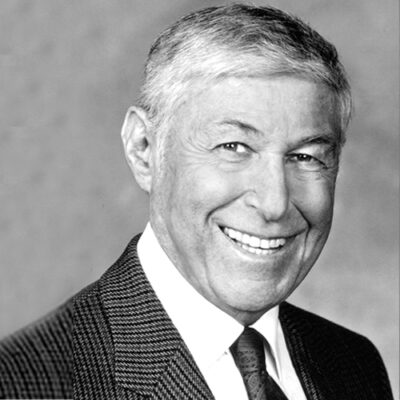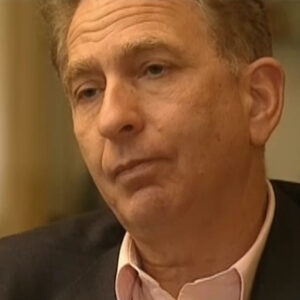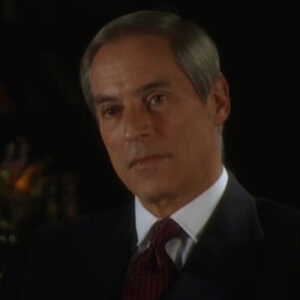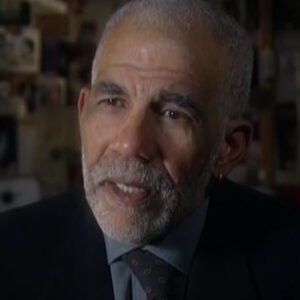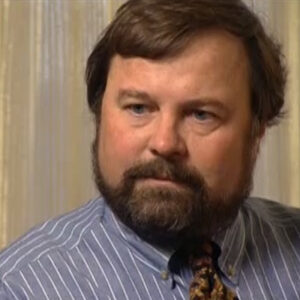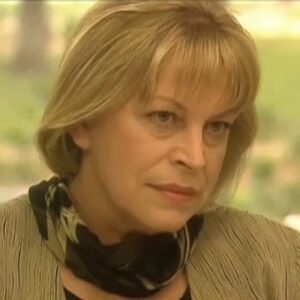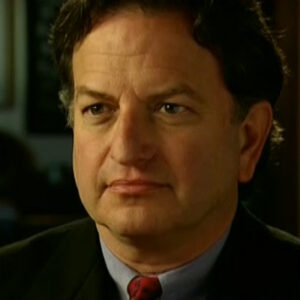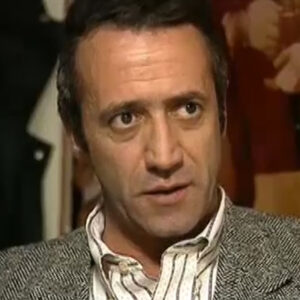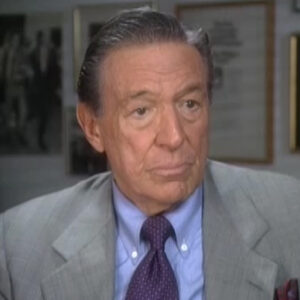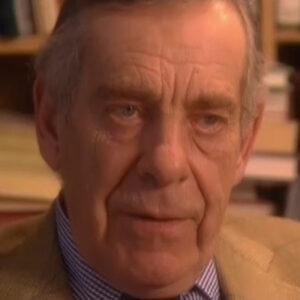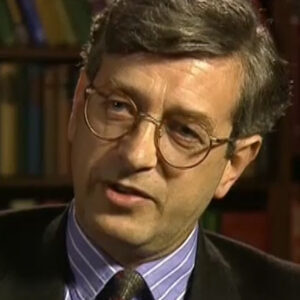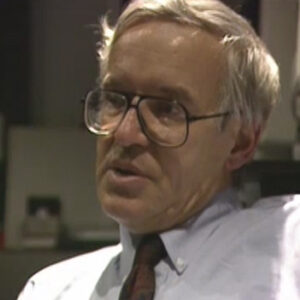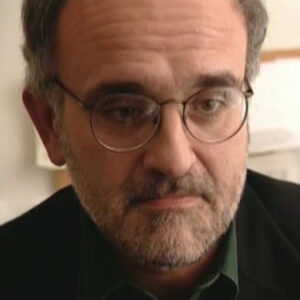Speaker Always reputation was as high as probably the the most innovative and hard driving director we had and producer, of course, the he Don always has had almost a kind of a pogo stick reaction to the news.
Speaker Whenever anything happens, he’s he’s almost physically hopping up and down with ideas of how to get at the story and what should be shot, who we should be talking to. And he’s dogged in pursuit of a story.
Speaker That’s what I was wondering, wondering what was he since he has such an expansive personality, what was he like as the producer of your broadcast?
Speaker He was a of exciting delight to do work with and with his entire take on again, obviously, but also in producing the evening news, he was a delight to work with because of his excitement.
Speaker He was tough. And those who had to work directly under him, those producers and correspondents out in the field could feel a strong lash on their back as he drove them to what he believed they should be doing in any particular story, as he was. But but that is what made the news under Don Hewitt as he designed the early evening news broadcast first in the field, CBS 48, I guess the year was and and then took that same talent, of course, over to 60 Minutes.
Speaker Absolutely. Let’s try that again, starting with maybe let’s start at the other end.
Speaker Let’s start at the fact that he he he had this talent that first came out in forty eight and then he brought it to your broadcast and then he brought it to 60 Minutes. I mean maybe if we just reversed the order of of of you know what I mean.
Speaker All right. But let me warn you, we don’t have a lot of time redoing these things. You may be losing out on other questions, but if you want to redo it, we’ll do it once and then we’ll go ahead and do it. OK.
Speaker Don Hewitt, of course, was the pioneer in evening news broadcasts. He started the CBS Evening News in 1948 with Doug Edwards fame broadcaster and from that eventually went to 60 Minutes, created 60 Minutes for what it is today.
Speaker The evening news was his of his invention. 60 Minutes is his invention. They were his ideas that that created these broadcasts. Much of what we see today on the evening news was pioneered by Don Hewitt.
Speaker Right in being a do anything to get the story type producer. Would he sometimes go too far? And if so, can you think of any example?
Speaker The only problem I ever had with Don was that he was so aggressive in going after the story that I I wasn’t always sure what arrangements he’d made to get the story. And it concern me a bit because I think Don was so anxious to get the story and so certain that he might run into conflict with me and perhaps some others, that perhaps he shaded the truth just a little bit and telling us what he’d done to get get that particular story. It gave me some concern in our days working on the evening news, I’ll admit, is that the reason that he got fired?
Speaker Well, getting fired is I’ll take it again. Of course, Don left the evening news at a given point, and I suppose it could be interpreted perhaps as a firing. I don’t think he wanted to go. So I assume that it’s a firing.
Speaker But there certainly wasn’t any idea at all that he would leave CBS News. The idea was that there were there were probably other fields that he might do and and perhaps bring some new ideas to CBS News and other fields than the evening news itself. It was very shortly after he left the evening news and it may have even been before he left the evening news that excellent, who was president of CBS News at the time, presented the idea of a Sunday evening news summary type program. And Don took that idea and ran with it and created the 60 Minutes program.
Speaker Are you telling me that the idea for this newsmagazine format stemmed from Dixieland?
Speaker Well, I gather that the Dixieland was in on the on the early, early concept of a program, not perhaps 60 Minutes precisely, but taking Don’s talents and using them with another broadcast, in effect, a magazine program. And that how how who came up with the actual 60 Minutes format?
Speaker I think that was Don’s purely I want to take you back to a particular day when Kennedy was assassinated.
Speaker Obviously, you were it was an emotional day for the entire country. You certainly expressed your emotion on television. Don says that it was, you know, and, you know, just one of those days that he will never, ever forget like everyone else. Was there anything that happened that day that was interesting between you and Don that took place trying to keep the news going for thirty six hours?
Speaker Was there anything that you remember an interesting anecdote about that day, about that broadcast that shed some new light on it for us, the the Kennedy assassination weekend, the assassination itself, and then the subsequent events right up through to the funeral four days later, or, of course, highlights of all of our lives and broadcast journalism.
Speaker He and Don was the director of our producer of our coverage through that entire time. He did his usual brilliant job in doing it.
Speaker And I really do feel that CBS was on top of that story in a superior way, if you please.
Speaker I don’t Don, in covering Mr.. I like that or anything where we were covering a live event, political conventions, for instance, which he was also a master, the in those times our communications were were business communications. There were John would be enthusiastic about something we were doing at one point disappointed, and let us know that he’d like something better or different at other points. But there was never any serious conflict or or really any particular drama in it that I remember was all business or both of our adrenaline flow a lot faster at times like that.
Speaker We were in harness nearly all the time. I think there might have been moments where he’d say, let’s go there. Well, I know one conventions we had a lot of problem with we want to go someplace. And I was just wrapping up another area of coverage and it wasn’t time to go there yet. But but a correspondent out on the floor of the convention or in some other point of the convention city would come in with I’ve got an interview here. I’ve got Senator So-and-so ready to go. Don would accept the fact that the senator would be lost in a few minutes if we didn’t go right to him. I was in a floor the story of the convention floor, and I would reject going. And I got to be known as a as a matter of fact, as a lens hog, because sometimes I wouldn’t go instantly and they would lose lose an interview. And then Don and I might have a word or two, but it was all over the course of business and we understood that.
Speaker Can you see the Zapruder tape, the Zapruder film that, as you know, there was this amateur photographer who had home movies, basically of the assassination that became known as the Zapruder film. You didn’t get that to be put on the are any recollections of Don trying to get rid of Dan Rather, trying to get rid of it? Do you have any recollections surrounding the Zapruder film of that day?
Speaker Of course, during the assassination, one of the big catches journalistically would have been getting hold of the film that made Mr. Zapruder shot home, movies that actually showed the moment of impact of the bullet on President Kennedy and every news organization in the world was trying to get hold of that that film. Nobody did. Of course, immediately, I don’t really know what efforts are being made by Don and others to get it. I know simply know that we were trying hard.
Speaker OK, good. In the short time that I’ve known Don, he has shown me a program that he produced and you narrated on Frank Sinatra three times. Are you do you remember?
Speaker I remember the senator interview very well. Of course. I’m sure the you know, I’ll take that again if you want. There was a one of the more memorable moments with Don was in getting an interview with Frank Sinatra that we shot out at his home in Palm Springs. And it was another dawn scoop. He got the interview. I didn’t get it, but I was the the interviewer for his feature on Frank Sinatra. And we had a little problem on that one.
Speaker The as I was sitting there with Sinatra and doing the interview, of course, and talk to Don in doing those things, didn’t necessarily work terribly closely with Don. And what we were going to ask, that was my part of the job he got in the interview. He was shooting it and I was doing the the interviewing and the question mostly mine. He’d probably say, I guess you’re going to cover this. You’re probably going to cover that. We agreed that was what we’re going to do. And at one point he had said no, I hoped he understood because I knew he’d gone to Sinatra’s management, obviously lawyer and sidekick to get this interview. And I said, you understand? Of course, I’m going to be asking him about Mafia connections. Does he have them? What about that story? And I said, of course, a part of the story. No question about it. The the we’re in the courtroom in the course of doing the interview, and I hadn’t gotten to that yet. And Don whispered to me at one point, I think Frank Sinatra had gone out of the room for the moment. And he whispered to me, said, don’t forget. Often in the Mafia. So I said, don’t worry, I’m not going to forget the Mafia and we when we came back sometime thereafter, that real or the next one, I got around to it and it reminded me a couple of times, don’t forget the Mafia. So I finally got around to the question. I said to Frank Sinatra, how do you answer the charges that you have Mafia connections? Well, Sinatra looked at me like like he could cut my throat and I might. And as a matter of fact, in the next second, amps got up and stormed out, and that’s about everybody else, forget it, and stormed into the room and and his his sidekick called on into the back room. And they had quite a long discussion. And Don came back and Sinatra was coming back and Don said, it’s all fixed. He’s going to give you the answer to that question. But we’re not supposed to probe any further. I mean, he handled it as well as you can, but. Well, we actually we got what I thought was fair enough. But Sinatra answered the question, look, I get pictured with these guys because I work backstage and in many, many nightclubs, others and people who own the clubs and who were associated with the owners of the clubs come back and have my picture taken with them. That doesn’t mean I’m in league with them or anything. The guy I don’t have any mafia connection, you know. Well, that that did so if I didn’t have to probe it a lot deeper than that. But I had an awful feeling that. And as a matter of fact, Sinatra told me, he said, I had a deal with your guy, Don Hewitt, that you weren’t going to ask any questions on the Mafia. And it makes me wonder, did Don get the interview by telling them we weren’t going to ask that question and then figure or figure it to be up to me to carry the brunt of surprising them with such a question?
Speaker That kind of thing happened on a couple of occasions, actually.
Speaker Yes. Fred Friendly, according to Don said, told when he told him that he would, he said came to him and he said, you know, the evening news, meaning your program isn’t big enough for you. And that was the expression that was used by Fred when he was basically firing Don. Are you aware of that? No.
Speaker OK, we’ll go on then to something else. Lastly, I want to ask you something about 60 Minutes, 30 years after the debut of 60 Minutes, the program is still going strong.
Speaker It seems to be very special. It seems that it’s almost part of our collective unconscious. I mean, America thinks in that form there’s been 20 imitators of it. What makes 60 Minutes so special and what is it that you think captured the imagination of the public so strongly?
Speaker 60 Minutes holds its audience and has for these 30 years because it is a superior news program news program, it never has sunk to feature ization to the point of not being news oriented, even when I have been a little critical personally.
Speaker Not publicly, but of a piece that I thought was dipping a little bit toward the Hollywood stuff. There was there was a good reason for the piece at that time. That individual was in the news. I’m not talking about salacious material, not talking about scandal, but I’m talking about they’ve done a particularly interesting job. They they had won some recognition that required the public interest. Who would like to have some more information about that individual, the personality pieces they’ve done, which seemed to dip into that kind of situation at the same time are people who the public should have some interest in if there’s a reason for them to be there? It’s never lost its focus in that regard. Never been tempted to say, well, I won’t say never, but I’ve just been tempted. And it’s slipped a few times. But generally it has never lost the focus on that program of being news oriented. It began life in its early years because it was the only place on the air that was doing the kind of investigative journalism that it has become famous for and reservedly so that it really, really was a tough broadcast. You know, they’re all the jokes about the first words of a the businessmen can hear or there’s a general on 60 Minutes here, you know, the that that that kind of law spread across the land. And it made it a must watch broadcast for most people. There was something on there every Sunday night. And Monday morning would be a topic at the at the business office. Did you see 60 Minutes last night? And it became almost mandatory for the for everybody to see 60 Minutes because they were sure to be asked, did you see it when somebody want to talk about it? It was that kind of a broadcast and use that kind of a broadcast. It’s it it has served an important journalistic purpose and also inspiring others to to try to do that kind of broadcasting. Obviously, there’s never been really successful imitators of it. It it it opened up the magazine, a weekly magazine format idea, but none of the imitators, even on our own network, have ever done anything equivalent to what what the 60 Minutes does.
Speaker And why do you think that is?
Speaker For the reasons I’ve given, you know, that the imitators haven’t been able to.
Speaker Oh, well, the imitators some of them do very fine programming. I’m not suggesting that they’re not good program, but they don’t have that that muscle that the dawn exercises. You get it and his other producers and reporters have in there isn’t the steadfast message to their their drive for the that kind of perfection of investigative journalism and explanatory journalism? The others, I don’t know. They they’re a little a little soft, whether soft or definitely not a little, but a lot softer than the.
Speaker The Don Hewitt ethic, great, I have one last question, and that is in nineteen ninety five when 60 Minutes was nineteen ninety five, when 60 Minutes was forbidden to air the Jeffrey Weigand Tobacco Program.
Speaker I heard what you said on Frontline, and I will repeat it to you if you like, um, you said the management of 60 Minutes has the power there quite clearly to say, I’m sorry, we’re doing this because we must do it. This is a journalistic imperative. We have this story and we’re going to do it.
Speaker We’ve got to take whatever legal chances are on it. Do you think there was something else that, Don, as the executive producer, as a steadfast employee of sick of CBS News for 50 years, do you think there is anything he could have done to get that show on the air?
Speaker The in the case of the tobacco story that that 60 Minutes wanted to do a couple of years ago and was, quote, forbidden to do by the legal department of CBS for fear of very heavy suit, slander suit or whatever against CBS.
Speaker ABC had just suffered a very heavy fine for similar tobacco story. I was disappointed that that Don Buchwald, if you please, under that pressure, Don’s position at CBS is such that they’re not going to let him go. It’s a huge moneymaker, the only program I think that ever had the record run, as has, I don’t know, many years now in the top ten and that sort of thing. They’re not going to they’re not going to let that go. I mean, they’d rather pay a billion dollar fine than to let them go. I think, Don, strength was should have been greater is greater than perhaps he estimated it to be, although that seems unlikely to me. I think, Don very appreciative of his strength. I felt that Don should have stood up against him at that time. I was disappointed.
Speaker OK, he claims and this is just the last question he claims because I spoke to him about this, that he does not have. If the president of CBS says you cannot put this on the air period, that he does not have the power to go to get it on the air, he has the power to quit.
Speaker Excuse me. Well, let that stand. Well, what could Don do about it?
Speaker Sure. He’s an employee. He’s supposed to do what supposedly I think the president of the company wants. But on the other hand, if the president of the company was not a journalist, fails to understand the responsibility of the news department and 60 Minutes, Don Hewitt, to the degree that he damages the integrity of the program and denies the people of the United States, the facts that a news organization in this case, 60 Minutes, had developed, he is being irresponsible and it is up to the news individual if it has the strength to do it, to say no.
Speaker And what is his ultimate strength? Walk out, quit. Now, that’s you can’t it’s hard to say that to to a president.
Speaker Certainly if you’re in a position where you’re going to get fired and and more importantly, underlings perhaps will get fired who can’t afford it. But on the other hand, the strength of the program was such that it wasn’t going to go away. Now, Don might have been fired, but that would have been heroic if that throwing himself on his sword, if you please, would have perpetuated him as a martyr. Every journalist in the world would be building a statue to him and have an icon of Don Hewitt in his office for doing that. It would have given strength, perhaps, to the news departments all over America that are constantly under pressure from their bosses.
Speaker If he had done that, if he had needed to do it that way, it never would have happened. The company wouldn’t have let him quit, but he could afford to do it very well, afford it. And it would have been a wonderful show of journalistic strength and integrity.

